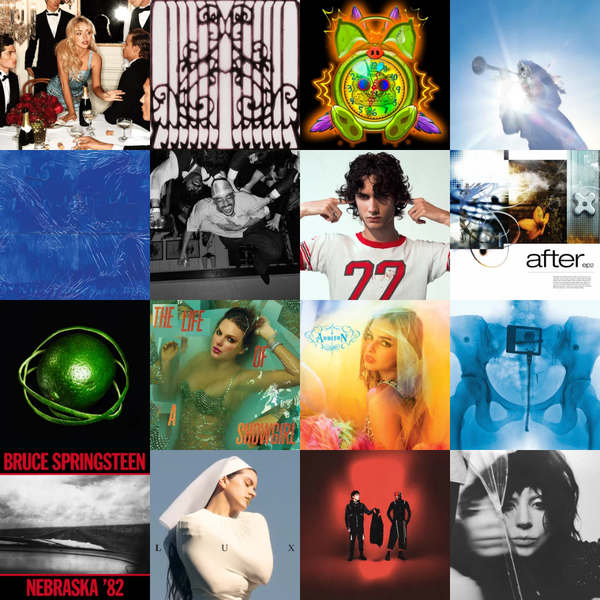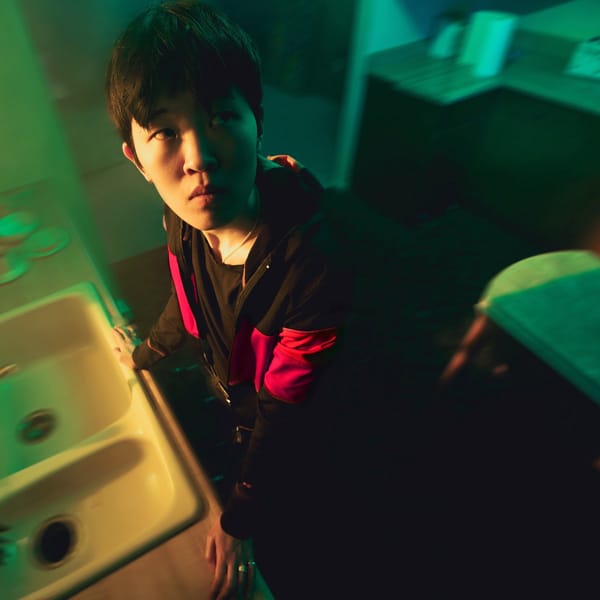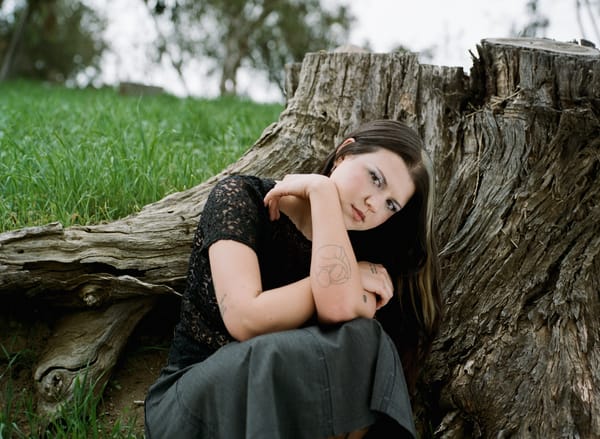NOTHING DEEP TO SAY SEASON 2 #1: Gordi Breaks Down "Lunch At Dune" (and her Charli XCX cover)
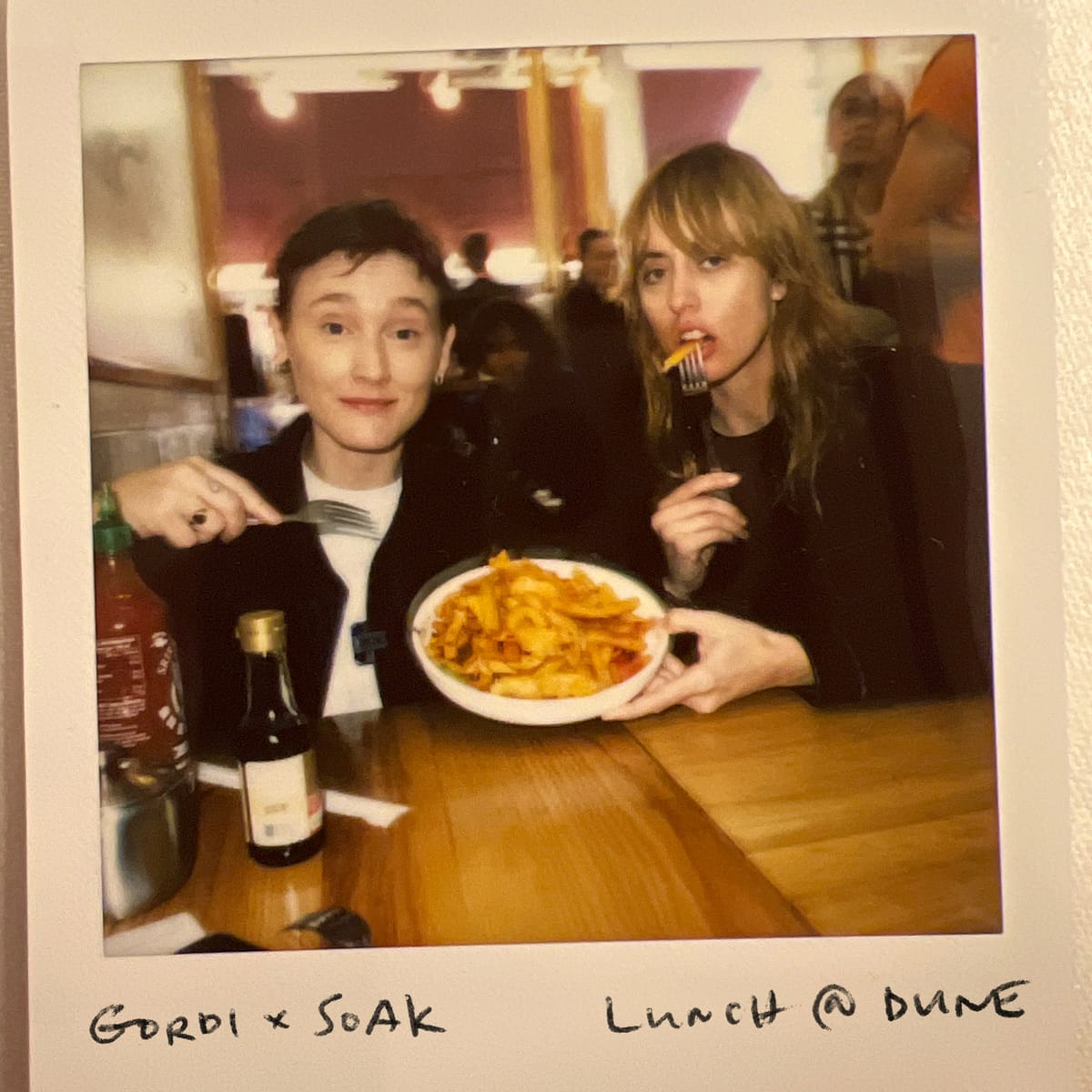
Hey all!
I've had trouble finishing this issue, which is why it’s out on Sunday: I’ve been deeply scared about what the next few years hold for myself and my loved ones. Every time I start to garner strength, a new wave of grief overcomes me. Those coming into power are ultimately too incompetent to get away with everything, but too powerful not to do some serious, difficult-to-reverse damage. If anyone has recommendations for organizations facilitating access to HRT/contraception/anything else that gives the oppressed more autonomy over our bodies, let me know and I'll post links moving forward.
All the progress made in the last half-century cannot be erased overnight, no matter how hard they try, though make no mistake, they’ll definitely try. “We're not going back" wasn’t a winning campaign slogan (nor, frankly, did the Dems offer meaningful enough change in their platform to justify it), but it remains a solid mantra when distanced from its origins.
Australian songwriter Sophie Payten makes deeply felt electronic-singer-songwriter music under the stage name Gordi. In 2020, Gordi released her sophomore album Our Two Skins, a stunning concept record about coming to terms with her feelings for another woman.
Gordi has released various projects and collaborations in the years since, whether reuniting with fellow Australian Troye Sivan, dipping into post-rock, or leading a house track. Her lyrics are often sparse, if not outright enigmatic; her expressive alto fills in the gaps.
Gordi is also known for her unconventional cover choices, including an energetic cover of Violent Soho's pub rocker "Covered in Chrome" and a mournful harmonium-led one of Linkin Park's "In The End". Most recently, she sang Charli XCX’s “Apple”, which we'll break down on the paid tier.
Here, we’re breaking down "Lunch At Dune", a track emblematic of the Gordi project – a gorgeous, lush piano ballad reassuring that this too, shall pass: "everything is fleeting, except you and I".
“Lunch At Dune" also features SOAK, one of the most articulate writers of the trans and queer experience I know. Their own album If I Never Know You Like This Again is one of the most underrated of the decade, so before you even read this article, stop what you're doing and listen to that album. Then read on, and learn about the song that made Chris Martin cry.
What was your entry into music production?
When I started writing music, and even started having a career as an artist, I really didn't know what production was. I thought I'd write the song, I'd go into a studio, someone else would help me get it to the finish line. And I guess over the course of my first record, I worked with so many great people, and that was really my entry way. I spent some time in Alex Somers’ studio in Reykjavik in Iceland together. And he was a real mentor for me. He showed me so many amazing techniques that I use to this day. More than anyone, he really shaped the way that I looked at music production and experimented. By the time I was writing my second record, I was producing the demos for my own enjoyment, rather than anything else.
How did you produce? In Ableton?
Eight years ago I had to produce a cover of a song for something for my label. I had never used Ableton before, and I owned Ableton because we used it in my live set. Every step of the way, I’d have a YouTube screen up like, “How do I press record?” I eventually started to use Logic, but I still kind of flick between Logic and Ableton.
I was listening back to the “Extraordinary Life” demo versus the final version, and how much denser that is. And so was that around the time you learned to use DAWs?
My second record [Our Two Skins] was an amazing learning process, because I made it with two really good friends of mine, Zach Hanson and Chris Messina. And they really taught me a lot about restraint. Both were great mentors as well, and taught me something that I then probably took into my next record. You put everything on, and then you just strip it all away until you're left with what you really need to make the song work.
Inhuman was self-produced, right? You've also produced for GUTHRIE and other artists.
A lot of the Our Two Skins stuff was fleshed-out demos. Chris and Zach were going through everything I had with a fine tooth comb, but that was my first foray into proper production. The Inhuman EP was a fun pandemic project that I was just working on, on my own. I did a bit of production for GUTHRIE, and I just produced some other stuff. One song that just came out [Road Rage] was for an artist named Alex the Astronaut.
I love that you're producing more for other artists, it also reminds me of the collaborations that you do.
It's a beautiful thing. I'm very lucky that these opportunities kind of seem to present themselves pretty often. I like to only collaborate with people who excite me. Particularly when there's been such a long period between my last album and the next one coming.
You’ve mentioned your formative influences include songwriters like Billy Joel and Carole King, do you feel a pressure to mess up a piano ballad with electronics, or make it “cool”?
It's not a pressure, more like, an interest. To me, the most important thing is that it’s got to be a good song, so you have to be able to strip it down to nothing, and it's got to stand on its own two feet. But to me what piques my interest in a production sense is texture, that’s a really important part of the ecosystem of the song. A lot of those textures can really communicate the emotion of the song. That's probably something I've become more cognizant of, even moving into this next record, matching those textures more with the emotion of the song. I feel like previously those two things were actually fighting with each other, kind of like in [breakthrough track] “Heaven I Know”, where those two things are almost antagonistic. For this record, I feel like those kinds of textures actually feel more aligned with the emotions of each song. That's how I love to make music. I love to kind of explore sounds. I love to find little crazy things that, when I go back through the stems, I'm like, How the hell did we create this? I don't know, but that excites me in the studio.
Do you use different DAWS for different processing?
Mostly I’ll use the DAW that I'm in, but sometimes I'll use actual hardware. So a lot of the time I'm singing through amps or funny mics or pedals or but then sometimes it's a plug in chain or a lot of effects buses. I often will run something through an effects bus, and then run that bus through another effects bus. It’s the same principle as if you're running something through tape and then you get the end product. You run it through tape again, until the thing disintegrates over and over again. And I can sometimes take that approach, but within the actual DAW.
Do you have any outboard gear?
I move around so often between LA and Melbourne, and it's just too hard to have hardware that I can access all the time. So most of it is in the box. The hardware I'm talking about is actual pedals, as opposed to actual outboard.
I feel like a lot of the songs, especially the stuff that you've released post Our Two Skins, are themed around reassurance. That's probably very useful when you're a doctor. Do you think that’s at all related?
I haven't drawn that parallel. Sometimes [in my music] I'm reassuring someone else, like in this song, and sometimes I'm reassuring myself. But I guess I have that role in some people's lives, whether it's in a medical setting or in a personal setting, to reassure them that everything's probably going to be okay.
BEAUTY IN THE BREAKDOWN:
“LUNCH AT DUNE” (produced by Sophie Payten and Brad Cook, mixed by Philip Weinrobe, mastered by Giovanni Versari)
VOCALS:
“The vocals started in the original session that I did when I was in a writing room in London. I kept the vocals from the original session. I went over to Durham to work with Brad Cook, a lot of this stuff I recorded with him.
"The SoundToys plugins are really hard to beat, and they're such amazing creative tools. Sometimes I will formant shift the reverb just a little bit. Or I will formant shift the vocal-double, which gives that a little bit more depth.”
“I have this Shure Green Bullet mic, which I use live a lot. Brad had a Green Bullet mic as well, as we finished the track, I was like I feel like we need something else. So I grabbed this mic, and we just ran the track, and I just kind of improvised into it, and ended up making a lot of nice little background textures and some counter melodies.”
“An SM7 is often my go-to, it gives a really low profile and doesn’t get too bright in the top-end. I have a U87 if I want a flashy, all-encompassing vocal, but equally I’ve been using the Bullet mic.
"Anything called ‘Puff’ is just because Brad's studio is called Puff City. Most of the backing vocals we kept from my original demo session. And then, of course, I got Bridie’s vocals sent from them.”
On SOAK:
“Bridie is an amazing artist. They had a breakout when they were around 15 years old, and they were nominated for the Mercury Prize. I was a fan of their music back then, so I actually went to see their show in this little church in Sydney around 10 years ago. And then I've really followed them closely, and we just became internet friends. We'd never actually met in person, but we had a bunch of connections. I was just sitting with “Lunch at Dune” for a while, and I thought, I just want another voice on it. And I couldn't get SOAK out of my head. So I sent them a message. They were driving through Portugal at the time, and they connected with it. They just recorded their vocals, remotely sent them over to me. And then we didn't meet in person, until a month ago [for the video.]”
They also sent me another take of improv stuff. And then I just basically chopped it up and took a couple of little moments and matched them to what was in the track.
DRUMS:
“The OP1 beat was from Matt McCaughan, who is the drummer in Bon Iver. He came in and did a bit of modular synth stuff, and also played some of the drums on this. Brad has a kit set up, and it sounds really beautiful, but a lot of the parts are pretty sparse. As the actual live drum arrangement goes, I fucked up the snare a fair bit.”
“I took the drum samples out, and I felt like the chorus needed more gravitas, and so I got the [kick samples], which, if you listen to them on their own without processing, it's just like a big, hefty kick, but I added Distressor and Devil Loc, and pitched down with SoundShifter, with a Valhalla plugin. That moment adds quite a lot to the start of the chorus.”
“The OP1 drums build pretty subtly under the mix, and then become quite overpowering by the end of the bridge, which I think is a really cool moment.”
PEDAL STEEL:
“The pedal steel (played by DeShawn Hickman) was a whole pass, then Brad sent me the stem, and I chopped up the little bits where I thought it was really impactful in the song. I ran it through Little PrimalTap and Pulsar EchoRec. There’s a few elements with this fragile distortion ,which adds a really nice touch.”
SYNTHS:
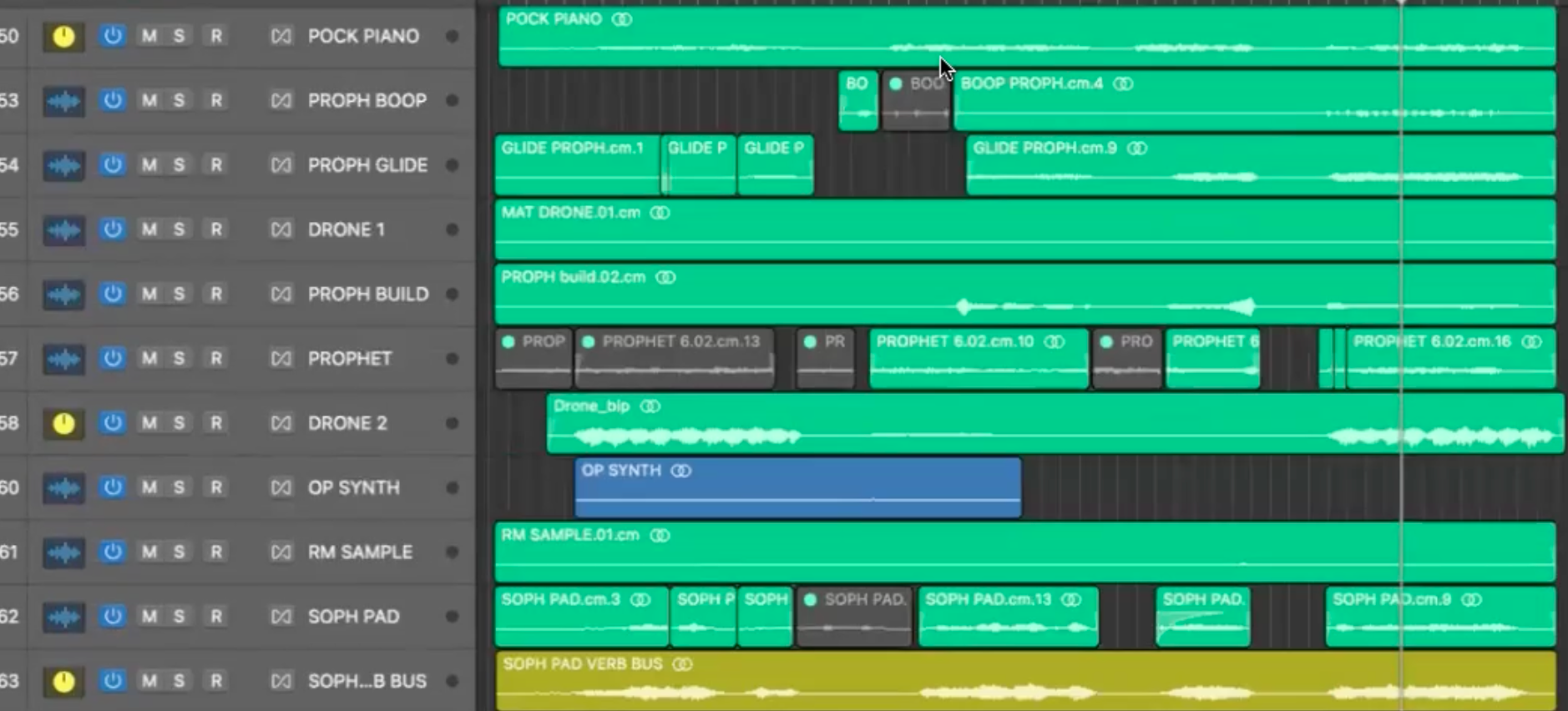
“A lot of the synths are from the Prophet that Brad has. It was either that or the Critter and Guitari Pocket Piano, and then a few things from the modular world. Some things from the OP1 as well.”
“The end is so lush, and there are a million little counter melodies in there on different instruments. What was important to me on this song, and on a lot of the songs on the record, was all the parts had movement, It's still more minimalist in the way that it's like picking a theme and staying with it, but that gives it more movement than hanging on a static chord.”
“As soon as I hear droning synths it makes me feel something. All of my choices in production are emotion-guided, and so that's why my greatest challenge in the studio is restraint. Everything that makes me feel something I want to explore, and I want to have it in the song. And so then it's like, adding all of these things, and trying to strip it all back.”
"The thing about 'Lunch at Dune' was when I took all the stems from Brad, I laid them all out because we're working in Pro Tools there.I thought it all sounds really beautiful as it is, so I didn't want to fuck with it too much. It was more like arranging and cutting big chunks out of different parts, letting different things sing at different points, rather than overly processing the shit out of everything all over again. Because a lot of what we did in the studio was like processing in a hardware fashion, through pedals and whatever."
MIXING WITH PHILIP WEINROBE (Tomberlin, Big Thief, Searows)
“He mixed a few songs for me, and he was awesome to work with. The first song he mixed for me, he basically delivered it back to me and he had gone down one path, and I imagined that he would go down another. I just put all that to him in a message, being like, ‘this is kind of where I imagined it would go’. And I've definitely experienced people to be way less receptive to feedback. He really took time to kind of understand what I was after. He added a lot of his own flair in the mix, and did a bit of formant shifting of reverbs and such, on his own. I love that, which was cool and took a bit of creative license. And I really loved all the decisions. The songs I sent to Phil are more in the indie camp, but they're not stripped back, so they're still full, bold arrangements. That was the goal for ‘Lunch at Dune,’ and he really nailed it."
Join the paid tier to see Gordi break down her entirely self-produced and mixed cover of “Apple” by Charli XCX! We have issues coming up with Lutalo, Allie, Raybody, and many more, so subscribe now.
